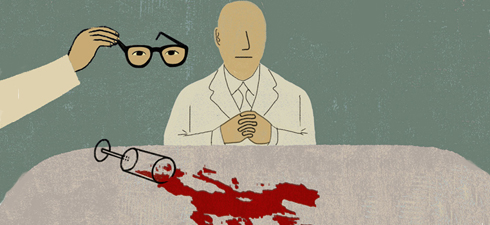With Spanish bond yields heading rapidly towards 7%, the Greek economy on the point of meltdown and the future of the single currency increasingly in question, the timing could hardly have been better for Brussels to publish its report cards on the 27 members of the European Union. This was the perfect moment for the European commission to take stock, weigh up the policy options and announce a plan to deal with the unfolding crisis.
The documents reflect the gloomy mood. There is a recognition that monetary union is going through its most troubled period since its creation. There is an acknowledgement - of sorts - that current policies are not working. And there are suggestions, born of desperation, for how Europe should respond: with common bonds, a banking union and the direct injection of funds into shaky banks from its permanent bail-out fund.
This was enough to give the financial markets a sugar rush as dealers took comfort from the fact that Brussels was perhaps a bit less clueless than it has appeared to be for the past few months. As a strategy for resolving the crisis, however, it will prove to be another dud. For one thing, all the big ideas have been floated before and all have been met with a resounding "nein" from Angela Merkel.
The deeper issue, however, is that even now the commission seems to be in abject denial about the bankruptcy of a strategy far too reliant on fiscal austerity. What's happening in the soft underbelly of the euro zone is that countries are seeing their public finances deteriorate as their economies languish in recession. For some, like Greece, the problem was always too much public borrowing, for others like Spain and Ireland the problem began with an orgy of uncontrolled private sector lending that has led to the state picking up the tab when the bubbles have burst.
The predictable result of weak growth and weak banks has been weak public finances. Financial help has been offered to the countries in most difficulty but only on condition that they meet tough targets for reducing their deficits. Spending cuts and tax increases have led to even weaker growth, even weaker banks and meant deficit reduction targets have been missed, spectacularly so in some cases.
Take this description of what has happened in Greece, where the recovery previously projected for 2013 has now - surprise, surprise - been further delayed. "Several factors hampered implementation: political instability, social unrest, issues related to administrative capacity and a recession that was much more severe than previously projected."
That pretty much sums things up, but there is scant evidence that - even now - Brussels really gets it. It talks about striking the right balance between the need for consolidation, reform and growth, but without accepting that the current mix is entirely inappropriate. Europe needs three things: a plan for growth; a plan to recapitalise the banks, and a plan to share the burden more equitably between the rich North and the poor South. It currently has none of these things. And that's why it is now fighting for its life.
European Union
“Europe on verge of heart attack”
The report of the European Commission made public on May 30 has sparked a harsh conclusion from French website Mediapart —
The European Commission seems barely aware of [the] debacle of the eurozone. [...] In short, despite all the alarms, all the warnings coming from all sides, [...] the Commission is not deviating from its path: one doesn’t change a losing strategy.
After running through the litany of Greek and Spanish ills, the site is surprised that —
At no time did they [the experts] ever stop to consider the question of the unfairness of the measure – too remote from their worries – or at least that of its advisability, while the economy is mired in deep recession and millions of people are in the unemployment lines.
The site discusses the roadmap sent to France, consisting of structural reforms and warnings about the public deficits, which reflects the fact that, for the Commission, “the debate on growth has been settled even before it was begun.” The site concludes —
After waiting for political signals that never came, it is the financial world that risks settling the fate of Europe – with great upheavals and violence.
Was this article useful? If so we are delighted!
It is freely available because we believe that the right to free and independent information is essential for democracy. But this right is not guaranteed forever, and independence comes at a cost. We need your support in order to continue publishing independent, multilingual news for all Europeans.
Discover our subscription offers and their exclusive benefits and become a member of our community now!












